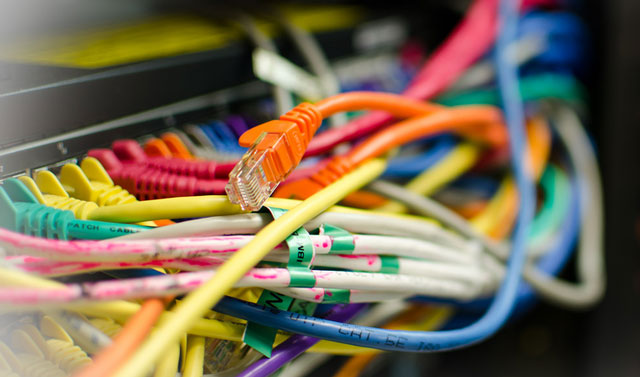 There are many factors that have allowed for the successful scaling of the Internet into a global phenomenon. A consensus-based, voluntary approach to standards, decentralised design and a vast body of openly-licensed software have all contributed.
There are many factors that have allowed for the successful scaling of the Internet into a global phenomenon. A consensus-based, voluntary approach to standards, decentralised design and a vast body of openly-licensed software have all contributed.
But the element I want to talk about here is layer independent design of the Internet. Internet infrastructure is based on something called the OSI 7 layer model, which breaks down communication into layers that describe everything from the wires or radios that carry signals all the way up to the applications you see in your browser or on your phone.
For the purpose of describing the Internet, we can simplify the OSI model into four layers, with access at the bottom, TCP and IP in the middle, and applications at the top. TCP and IP are the transport control protocol and the Internet protocol respectively, often referred together as TCP/IP. Together TCP and IP make up the digital superhighway that carries data around the world in understandable and manageable ways.
What makes these layers of communication so remarkable is that they are wholly independent of each other. TCP/IP doesn’t care what technology enables the access layer below it. If you change your access technology from copper to fibre to wireless, that change is completely transparent to the TCP/IP layer of the Internet.
Similarly, TCP/IP doesn’t care what is above it. Whether it’s HTML or mobile apps or streaming video, the TCP/IP layer is indifferent to what’s developed above it at the application layer. This means that new technologies can be introduced above and below the TCP/IP layer without affecting it. The enabling power of network layer independence cannot be overstated.
It is not surprising, then, that any attempt to mess with this structure should meet with heated debate as network neutrality is at the very heart of the Internet and how it works. At its essence, the debate is about whether all TCP/IP traffic should be treated equally or whether Internet service providers should be allowed to prioritise traffic from specific content providers.
In the US, there has been surprisingly little discussion about the access layer of the Internet in net neutrality debates. Reading between the lines, it’s implied that a combination of the cost of network roll-out and the power of network effects preclude new competition arising at the access layer. You also get the impression that it is assumed firstly that everyone has access to the Internet secondly that they can afford it. These might be reasonable broad generalisations for the US market and perhaps the industrialised world in general but it breaks down in a region like sub-Saharan Africa.
For millions of people in sub-Saharan Africa, the access layer of the Internet is simply absent. There is no infrastructure. Or, where there is infrastructure, access is comparatively expensive. If you are part of the roughly 50% of the world’s population that doesn’t have access to the Internet, then the debate about prioritisation of Internet traffic might appear a little hypothetical to you. Yet, as the net neutrality debate has expanded to the rest of the world through initiatives such as ThisIsNetNeutrality, a global net neutrality coalition, the debate has stubbornly remained at the TCP/IP and application layers of the Internet.
Emerging markets have responded variously to the issue of net neutrality. Earlier this year, the South African regulator made noises about having a consultation on the introduction of net neutrality principles. This provoked a reaction from the Internet service provider community who argued that the net neutrality did not reflect the infrastructure or market in South Africa, where managed bandwidth with throttling and caps are fairly familiar. I have argued along similar lines that net neutrality requires a different approach in regions where access is either scarce or unaffordable. In contrast to this, the Brazilian government has taken a strong stand in favour of net neutrality.
My insight from discussions over the last few weeks has been that it is possible to have a meaningful debate about net neutrality in poor countries but that we need to shift the debate to focus more on the access layer. If we can achieve neutrality at the access layer, then neutrality at the TCP/IP layer and above will become more meaningful. Net neutrality is a full stack problem.

In practice, this means that we need to create the same democratic principles around neutrality of access to infrastructure that inform the net neutrality debate at the TCP/IP layer and above.
In May, 50 prominent venture capitalists wrote an open letter to the US regulator in support of net neutrality. Their concern was that, without equal access on the Internet to a global market, small start-ups would not have the opportunity to experiment, adapt and grow. But what about neutrality at the access layer? What opportunities are there for small access start-ups to experiment, adapt, and grow? Very few. With the recent spectrum auction in the US topping out at over US$40bn, the opportunities for access by start-ups are virtually nonexistent. This needs to change.
In order to create neutrality at the access layer of the Internet, we need policies that enable access on a non-discriminatory basis to fibre-optic cables, radio spectrum and access infrastructure in general. If we achieve neutrality at the access layer, this would also reduce the chance of neutrality violations at the TCP/IP and higher layers because plurality of access would reduce the likelihood of non-neutral services succeeding. Strategies to enable this might include the:
- Expansion and normalisation of unlicensed (WiFi) spectrum regulation around the world
- Adoption of dynamic spectrum regulation in the former television broadcast bands but also more broadly
- Adoption of “use it or share it” policies for licensed spectrum
- Creation of enabling policies and regulation for fibre-optic cable deployment, especially rights of way
- Adoption of open-access policies for all fibre networks with a public funding component
- Both private and public investment incentives for access entrepreneurs
- Reduction of bureaucratic red tape and regulatory tariffs for small and medium-sized access providers
Those are just a few items in a long list of things that could be done to create a more neutral environment for the access layer of the Internet. In turn, this would make the net neutrality debate a more meaningful one for countries where affordable, pervasive Internet infrastructure remains an unmet challenge.
- Steve Song is founder of Village Telco
- This piece was originally published on Song’s blog, Many Possibilities

